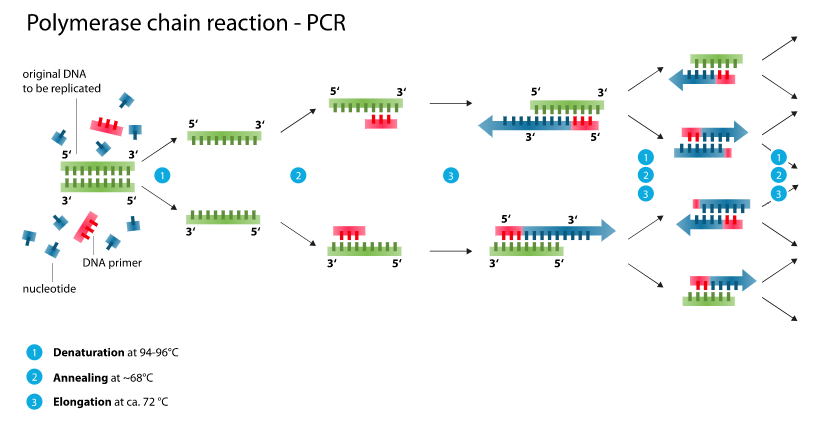Question
Question: Name the three important steps involved in the PCR process....
Name the three important steps involved in the PCR process.
Solution
PCR is a process utilized in the lab to make a huge number of duplicates of a specific segment of DNA. It was first evolved during the 1980s. PCR includes a process of warming and cooling called warm cycling which is completed by machine.
Complete step by step answer: PCR is shorthand for a straightforward yet extremely valuable method in sub-atomic science called the polymerase chain reaction. It is a process used to enhance a section of DNA of intrigue or produce parts and loads of duplicates. All in all, PCR empowers you to create a large number of duplicates of a particular DNA arrangement from an at first little example – in some cases even a solitary duplicate. It is a significant process for a scope of hereditary innovations and, actually, has empowered the advancement of a set-up of new advances.

PCR process
Stage 1: Denaturation - As in DNA replication, the two strands in the DNA double helix should be isolated. The division occurs by raising the temperature of the blend, causing the hydrogen connections between the reciprocal DNA strands to break. This process is called denaturation.
Stage 2: Annealing - Preliminaries tie to the objective DNA groupings and start polymerisation. This can just happen once the temperature of the arrangement has been brought down. One preliminary ties to each strand.
Stage 3: Extension - New strands of DNA are made utilizing the first strands as layouts. A DNA polymerase catalyst consolidates free DNA nucleotides. This protein is regularly Taq polymerase, a compound initially disengaged from a thermophilic microbes called Thermus aquaticus. The request in which the free nucleotides are included is controlled by the grouping of nucleotides in the first (layout) DNA strand.
The consequence of one pattern of PCR is two double abandoned successions of target DNA, each containing one recently made strand and one unique strand. The process is rehashed ordinarily (typically 20–30) as most processes utilizing PCR need enormous amounts of DNA. It just takes 2–3 hours to get a billion or so duplicates.
Note: Polymerase chain reaction (PCR) is the process where the enhancement of the quality of intrigue is done with two arrangements of groundworks and a thermostable DNA polymerase protein Taq polymerase. The process includes the accompanying advances:
Denaturation: The double abandoned DNA is warmed up to 98 C which causes the hydrogen securities to break and the two strands get isolated.
Strengthening: The two arrangements of groundworks are added which tie to the proper correlative portion of DNA strand.
Augmentation: The Taq polymerase chemical polymerizes the nucleotide chain utilizing the nucleotides given in the medium and by utilizing the format strand.
